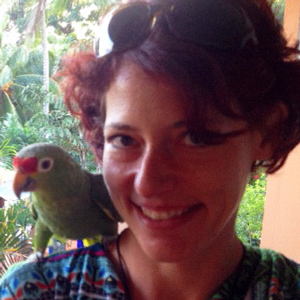Traveling in a Financially Sustainable Way : On the Road with Nora Dunn
This is a travel hacking case study. (Read others or nominate yourself.)
Long term traveling doesn’t have to be expensive. In fact, it can actually be cheaper than staying in one place with rent, bills, and a home. Nora Dunn, originally from Canada and now from “anywhere,” has mastered the art of being permanently on the go without breaking the bank.
Tell us about yourself.
Hi there! I’m Nora, AKA The Professional Hobo. In 2006, I sold everything I owned in Canada (including a busy financial planning practice) to embrace my dreams of traveling the world—slowly, immersively, and intensively. I had no idea where I’d go, how long this “travel thing” would last, or how I would be able to financially sustain myself beyond my savings and the two years of income that selling my business kicked out.
I simply knew I had to go, and with that leap of faith … I went. I’ve been on the road ever since, having lived in and/or traveled through over 45 countries and counting. Now, I teach other people how to travel in a financially sustainable way.
Okay then, best financially sustainable travel tips. Go!
I have upwards of 120 tips on my site! Here are a few that stand out:
1. Try mystery shopping on flights.
You can book flights at 50% off (or more) as a mystery shopper on an airline.
2. You don’t have to pay for accommodation.
In my first five years of full-time travel, I saved over $63,500 in accommodation expenses, and accumulated a repertoire of experiences that I couldn’t possibly have paid for. In 2011 alone, I paid $173 for accommodation—for the entire year. It’s totally doable with Couchsurfing, home exchanges, and volunteering in exchange for housing.
3. Set parameters for your souvenir shopping.
Instead of traditional souvenirs, which are pretty useless, I choose items that both define an experience or place, and are practical complements to my one-bag traveling entourage. Ideally, my new item replaces something else that has worn out, so the new purchase isn’t an extra weight/bulk.
How do you pay for your travels?
Before I get there, I have to say that income is just one half of the equation. Expenses are the other. In my experience, full-time travel costs less than it ever did for me to live in one place. Part of the reason for this is that I travel slowly, and I choose immersive experiences that have the added benefit of providing free accommodation, such as house-sitting, volunteering, living on boats, and hospitality exchanges.
As for how I pay: travel hacking. Freelance writing. And accidentally, my travel blog. I inadvertently launched an international NGO in Thailand to help the survivors of Cyclone Nargis in Burma in May 2008, and my site gained international attention.
Another natural disaster came my way in Australia (the Victorian Bushfires of February 2009), and my blow-by-blow chronicle of the events brought in more readers, and it was archived by the National Library of Australia as “a piece of history.”
What sorts of travel hacking do you do?
I was only a passive collector of miles with my credit card until Chris Guillebeau introduced to me the virtues of frequent flyer miles. After earning 150,000 miles on US Airways for doing $1,200 in online shopping, I was sold. I’m an active (but not obsessive) collector of miles, with a smattering of points across about half a dozen different airline programs. This also makes me an air travel snob; when flying long-haul, I only do it in business class.
What inspired you to travel?
When I was 8 years old, my teacher showed us a documentary about world cultures. I was fascinated. I saw people, but I didn’t recognize their garb, the language they spoke, the food they ate, the markets they shopped at, or any part of the architecture or scenery. And I desperately wanted to know how the children my age played, and what daily life was like inside their homes. This was the very root of my literal life-long dream of travel.
As an adult, I discovered the paltry vacation allowance and limited funds that came with a full time job meant most trips were only a week long, and were often superficial attempts to escape Canada’s long winters rather than being culturally immersive experiences. I had to free myself up to actually live around the world.
Can you tell us about a person you met who helped you better understand a culture?
Sheralee was the ambassador of the Australian Aboriginal Tent Embassy in Canberra, Australia. The Embassy is home to a 38-year protest from the Aboriginals to the Australian Government, and a fire that doesn’t go out. Having been warned by other Australians about the “dodgy” aboriginal population, and seeing Sheralee’s derelict appearance including only one boot, I was wary when we began talking.
But after spending an afternoon with her I realized she was educated, well-traveled, experienced, and well-spoken. My initial impression based on her personal appearance was mistaken. As a traveler, I’ve always prided myself on having an open mind, and yet here I had allowed pre-conceived notions and appearances to cloud my judgment.
It’s these qualities that (at least in part) led to aboriginal issues in Australia to begin with. And here we all were, standing around a 38 year old fire flickering with those memories. I had to confront my own judgements and prejudices head-on.
The great debate: aisle or window?
Window!
Where are you headed next?
I’m currently writing this from the Sacred Valley of Peru, where I’ve set up a home base. After 8 years of roaming the world full-time, I’ve finally reached a point where I want to have a place to call mine, where I don’t have to abide by anybody else’s house rules, timetables, eating schedules, or share a bathroom.
It’s the best of all worlds: I have all the comforts of home I need, and yet every time I step outside my front door I’m in a totally different world to the one I grew up in, full of discovery and wonder.
Follow Nora’s journey on her site, The Professional Hobo, or via Twitter @hobonora.
###










